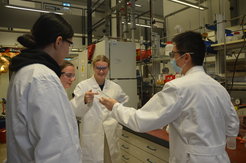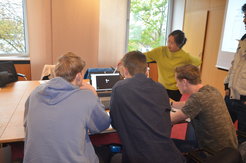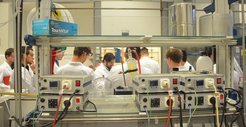An exchange from which both sides benefit: School students of the Karl Ziegler Schule spend an experimental day at the MPI
Polymer chemistry is on the curriculum of secondary schools so that high school students are familiar to run reactions on polymerization in the school lab. But why not visit the place where a groundbreaking process for the production of plastics at low pressure was discovered? This becomes even more evident when you consider that Karl Ziegler – the namesake of the school – invented it just around the corner at the Max-Planck-Institut für Kohlenforschung.

Chemistry teacher Andreas Osterfeld explains what motivated him to come "It's very exciting for our pupils to conduct practical experiments in real research laboratories together with the doctoral students and researchers. They jump into the world of science where everyone speaks English and suddenly experiments whose usefulness has not always been clear in the classroom make sense in the practical context. The cooperation with the MPI is very valuable for our students - both from the technical input and for later career orientation," he adds.
"School cooperations also make sense for our institute," states PD Dr. Claudia Weidenthaler. The group leader has been in charge of contact with schools for many years and carries out joint projects with almost all secondary schools in Mülheim an der Ruhr. "We want to arouse interest for the natural sciences and introduce pupils to our field of research. Catalysis as a key technology is important for so many issues that affect society such as sustainable energy supply or resource-saving production processes”, she explains. The institute has put together a repertoire of experiments that students can use to conduct experiments on many topics, such as energy storage, polymers, fuel cells or biodiesel. "In this way, they learn about working in science and may later decide to apply for an apprenticeship or study chemistry," says Weidenthaler.


On the experimental day in October, polymer chemistry was on the agenda. Together with researchers from the Department of Molecular Theory and Spectroscopy, the students learned how to use computer chemistry methods. They calculated the enthalpy of polymerization reactions and created simulations of molecules. In the laboratory of the Department of Heterogeneous Catalysis, the groups had the opportunity to find out how a superabsorbent polymer works. Superabsorbent polymers are used in baby diapers and ensure that the liquid is optimally absorbed and sealed. In a practical experiment, the team determined the correct proportions of water and required absorber, which an R&D chemist in industry would also specify. In another lab, the students learned how to manufacture conductive polymers and determine their properties. And, of course, a real Ziegler polymerization was on the agenda.

All PhD-students and postdocs of the Max-Planck-Institut für Kohlenforschung envolved in the experimental day enjoyed to work together with the high school students. "It's a valuable experience for us to talk about our research and to take on the role of teacher," says PhD-student Abdurrahman Bilican from the Functional Materials group. "Some of us may later go into teaching or lead a team and can gain important experience while guiding the students."



